by Bill Murray
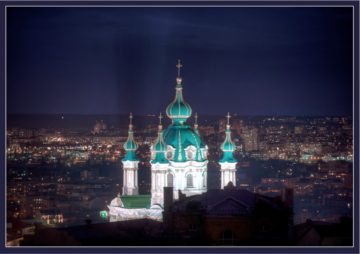 Anticipating war in Europe, 2022.
Anticipating war in Europe, 2022.
Thursday, 13 January
If an attack is imminent, Kyiv’s air raid sirens will alert residents to tune in to emergency service announcements. Cars equipped with loudspeakers will also patrol the streets to announce important information.
The Kyiv City Council has posted an interactive online map, which shows the locations of the roughly 5,000 official locations where residents can shelter from a military attack. Of that number, 514 shelters are purpose-built facilities dating back to the Cold War where people can remain for days on end.
Each citizen should prepare an “emergency suitcase” ahead of time. This should be a backpack with a capacity of at least 25 liters, a little more than 6.5 gallons, containing “clothing, hygiene items, medicines, tools, personal protective equipment, and food.” The service also recommends carrying important documents and cash in the backpack.
Friday, 14 January
“Sweden, which is not part of NATO, has among other things noticed a number of landing craft from Russia’s northern navy which have been entering the Baltic Sea,” the AP reported. The next day … all three Russian Baltic Fleet Ropucha-class heavy landing ships departed Baltiysk (a port in the Russian exclave of Kaliningrad). These can each land 25 armored personnel carriers.
Saturday, 15 January
“Police in Sweden deployed patrols and helicopters to the Forsmark nuclear plant to hunt for a large drone seen flying over the site late on Friday,” and SAPO, Sweden’s spy agency, said today it has taken over the investigation, now into drones at three nuclear plants, Forsmark, north of Stockholm, and “Ringhals, which is the largest of them and sits on the country’s western coast,” Euronews reports.
Meanwhile the State Department has held talks with international energy companies over contingency plans for European natural gas supply in case of an actual conflict.
Sunday, 16 January
The Biden administration’s foreign policy, even if it turns out not to be wrong, has seemed uncertain from the start. It’s hard to forget the deer-in-the-headlights look of Secretary of State Blinken as the Afghanistan withdrawal began to fall apart. I don’t want to join the belligerent voices calling from the start for flooding Ukraine with American heavy weaponry, but it is undeniable that the U.S. has been just about entirely reactive so far. National Security Advisor Sullivan tweeted: “All we can do is get ready, and we are ready.” I don’t know why you wouldn’t at least be standing on the White House front lawn clanging the alarm night and day.
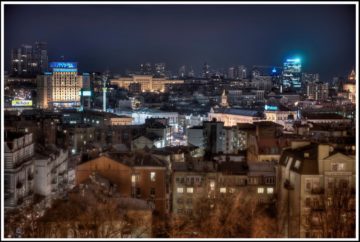 17 January
17 January
Russia’s sustained aggressive flexing forces attention to the real possibility of a coming Russian land grab in Ukraine. Not to amplify the beating of war drums, but it is important to be wide awake to what’s before our eyes, and real events coming fast and furious. There is plenty to see.
The newest of news is today’s arrival of Russian military vehicles on flatbed railcars owned by the Russian state railway in Belarus. These accompany Aleksandr Lukashenka’s announcement today that “joint military maneuvers will be held with Russia in February close to the borders with Ukraine as well as eastern NATO member states,” as RFE/RL has it.
Add to this the 100,000-plus Russian troops, tanks, drones and artillery on Ukraine’s eastern border. Then there are Moscow’s demands for unilateral disarmament that NATO cannot meet. And all the open source evidence of substantial military hardware moving west from as far away as Khabarovsk (opposite China on the Amur River) and Primorski Krai (where Vladivostok is, in Russia’s far east). There are those who contend it’s so, but it’s hard to imagine moving war materiel like tanks and rocket launchers across the entire Asian landmass merely as a bargaining tool.
There’s tension in the Baltic countries. Last week we saw jarring images of Swedish tanks rolling through the streets of Visby on the island of Gotland, an island that had been left unmilitarized from 2004 to 2017.
Germany will not supply weapons to Ukraine, in line with the previous German government’s “wise policy,” German Chancellor Olaf Scholz said on January 17th. His comments were echoed by German Foreign Minister Annalena Baerbock, who on the same day visited Kyiv as part of a diplomatic effort to reduce tensions caused by a Russian military buildup on the Ukrainian border.
19 January
The Dutch navy escorted 3 Russian landing craft from Baltic Fleet (Kaliningrad) thru their territorial waters on 19Jan. ETA in Black Sea around eight days, around January 27th.
20 January
The U.S. Treasury has sanctioned four Russians today, declaring, “Russia has directed its intelligence services to recruit current and former Ukrainian government officials to prepare to take over the government of Ukraine and to control Ukraine’s critical infrastructure with an occupying Russian force.”
21 January
Will local strongmen make their own moves? Russia has stalled conflicts in Transnistria, Abkhazia, S Ossetia. There’s Taiwan. What about an Iranian breakout toward nuclear weapons?
23 January
Russia is forcing a conversation the US doesn’t want to have, at least not right now and not on Russia’s terms.
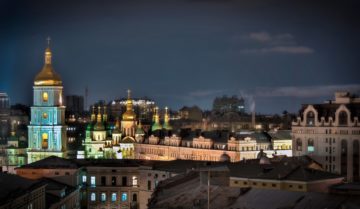 24 January
24 January
It was always thus. Political texts usually age about as well as hair styles, but if Russia causes pain in Ukraine, note George Kennan’s words from the Long Telegram he wrote as US Ambassador to Moscow in 1946:
“In summary, we have here a political force committed fanatically to the belief that with U.S. there can be no permanent modus vivendi, that it is desirable and necessary that the internal harmony of our society be disrupted, our traditional way of life be destroyed, the international authority of our state be broken . . . .”
27 January
“And Germany also supports Ukraine militarily. In particular, I would like to state this clearly here, we are now supplying protective helmets,” German Foreign Minister Annalena Baerbock said at the debate on Russian military threats to Ukraine at the Bundestag on Thursday. 5000 helmets.
Meanwhile Russia barred Finland from using its airspace, forcing the temporary cancellation of most of Finnair’s Asian destinations, including flights to South Korea, Singapore and Thailand.
28 January
“Russia’s military buildup near Ukraine has expanded to include supplies of blood along with other medical materials that would allow it to treat casualties.” Blood supplies aren’t generally needed for military exercises, are they? Especially in a pandemic, with your own healthcare system under strain?
31 January
The U.S. embassy in Kyiv ordered American family members to leave the country yesterday.
Realization has shifted from “surely he wouldn’t?” to “he’s really going to, isn’t he?” If Russian military hardware enters and remains in Ukraine, then Poland, Slovakia, Hungary and Romania will join Norway, Finland, Estonia, Latvia and Lithuania as frontline, newly hostile border states.
A fundamental geopolitical realignment is hurtling our way that will not simmer down for years. By spring, tens of thousands of Ukrainian refugees – or more – could be storming the borders of Poland, Slovakia, Hungary and Romania, and how can they, how could they hold them back?
Current NATO borders in Estonia, Latvia and Norway will be reinforced, and depending on the depth of the next couple of months’ ill will, Finland’s border may be too. With sudden new face-to-face NATO/Russia exposure, all sides will want substantial, fortified borders. Each country will surely want its own sovereign border backed by its own conventional forces. Here come concrete barriers, anti-vehicle trenches, mesh fencing, electronics, guard towers, barbed wire, electronic and other defenses. Suddenly, it’s a good bet that Schengen’s best days are behind it.
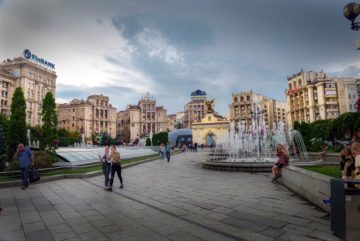 2 February
2 February
Remarks from German Chancellor Olaf Scholz today: “You can’t overlook the fact that there are a lot of soldiers and troops on the Ukrainian border. All that could be the precondition for military action.” No, you really can’t. And yes, it could.
5 February
Russia has 83 battalion tactical groups, each with around 800 soldiers, near Ukraine with another 14 in transit. That means Russia has about half of its total number of BTGs near Ukraine, about half of Russia’s ground combat power. US intelligence has predicted about 100 would be needed for a full-on invasion.
7 February
The Munich Security Conference announces Olaf Scholz, who has so far declined to provide German military hardware to Ukraine, will address the group the weekend of 18-20 February. In Munich.
8 February
Among the larger questions: how to handle borders between Belarus & NATO members Latvia, Lithuania and Poland when Russian troops don’t go home from Belarus after upcoming war games. New Russia/NATO borders are coming.
Russia lashes out at France: “Moscow & France couldn’t have reached any agreements,” Kremlin spokesman Peskov said.“It’s impossible because France is a member of the EU, & of Nato, where it is not the leader. A different country in that bloc is the leader. So how can we speak about any ‘agreements’?”
11 February
War propaganda at full boil today from Russian Foreign Minister Sergei Lavrov. Here are two quotes: “We explained in the tiniest detail today that Russia’s armed forces are on their own territory as distinct from the hundreds of thousands of British military troops deployed in the Baltics.” and “Apparently, our Western colleagues want to use @ZelenskyyUa as a tool to keep Russia off balance. Nobody is interested in what he thinks and what negative consequences this hysteria triggers for the Ukrainian economy.”
15 February
The eastern Mediterranean and Black Sea south of Ukraine are crackling with seaborne military activity tonight: “Forces from France, Italy, and the US conducted a rare tri-carrier operation in the eastern Mediterranean.” Meanwhile Russia has brought the majority of all the BTGs in its entire country, even from Khaborovsk & Primorskiy Krai, to surround Ukraine.
17 February
The Western leadership is banging every drum today. NATO head Jens Stoltenberg: “There is reason to be seriously concerned.” Biden: threat “very high.” “My sense is it will happen in the next several days.”
De facto absorption of Belarus into Putin’s new Slavic Union is right out there in public. As prospective provincial Governor Lukashenka said today: “There is an agreement with Russia that Russian ammunition in Belarus will stay after the exercises.”
Russia has issued impossible demands for de-escalation
- Ukraine implements Minsk agreements
- the West should stop weapons delivery to Ukraine, withdraw what was delivered already,
- recall all instructors and advisors from Ukrains
- prohibition of NATO joint exercises with Ukraine.
With apologies to Samuel Beckett and Barbara Tuchman, we’re putting down Waiting for Godot and picking up The March of Folly.
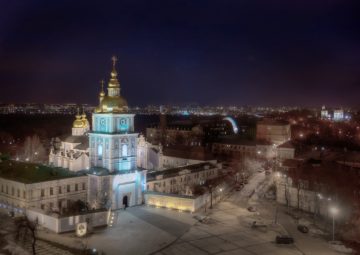 18 February
18 February
Much of the North Atlantic’s decision makers are in Germany this weekend at the Munich Security Conference. An OSCE document with a statement from US Ambassador Michael Carpenter contains this quote on Russian troops: “this is the most significant military mobilization in Europe since the Second World War.” There is a report that Putin is calling up reserves, even before any invasion.
President Biden said today he has reason to believe that Putin has made the decision to invade. He also suggested that Kyiv could be a target. I don’t think American officials have said explicitly that they believe Kyiv to be a target before this. It is an extraordinary thing to say. And to hear.
19 February
Finnish President Sauli Niinistö spoke at the Munich Security Conference today. If “much-loved leader” applies to any politician anywhere today, Niinistö would come to mind. After ten years as president, the Finnish leader, whose country shares an 833 mile border with Russia, and who has met Putin more often than just about any western leader, commands an 87 percent approval rating. Surveying the prospects for Ukraine he observed, “The means of being mean are changing.” The Finnish president as fledgling ESL English language poet.
Finland plays the role of grizzled veteran here. Culturally and linguistically distinct from Russia, it has maintained independence from Russia for 104 years. The dynamic is a little different for the Baltic countries. Most of the citizens of the three Baltic NATO states speak or at least understand Russian, the enforced language of the Soviet Union.
Russian speakers naturally seek out Russian media, so “while populists and clowns such as Vladimir Zhirinovsky—the leader of the (Russian) Liberal Democratic Party and a well-known figure in Russia’s ‘controlled opposition’ who has called for the immediate bombing of Kyiv—might be ignored in the Western media, in the Baltics, he and people like him are watched closely.” Just like Nigel Farage and Donald Trump will always find supporters, agitating Russians will find support in the Baltics. The threat of war is already in your house if you live in the Baltics.
20 February
The Beijing Olympics ends today. The American Sunday talk show Face the Nation reports this morning that “The U.S. has intelligence that Russian commanders have received orders to proceed with an invasion of Ukraine….” I was always skeptical about the whole “he’ll wait until the Olympics is over” idea. My mistake.
An interesting sidebar is the dilemma any Russian invasion of Ukraine will pose Turkish president Erdogan.
21 February
A Russian National Security Council meeting is on RT now with English translation, apparently on five hour tape delay. It’s a remarkable, surreal and frightening thing to watch. Just to be clear, this utter disregard for 44 million Ukrainians can only exist in the mind of a despot.
Today is history; this is no small thing. One of those before/after hinges, advertised far and wide, has now arrived. It requires working class Joe from Delaware to rise to the occasion, or not to. Eyes on you, Mr. President, results pending. From Volodymyr Zelenskyy’s speech to his country tonight: “We expect clear and effective support steps from our partners. It is very important to see now who is our true friend and partner….”
Whatever is to come will not be Reagan v Grenada, Bush v Panama, Clinton v Serbia or Reagan or Obama v Libya. None of those men became known as wartime presidents. Blue collar Joe Biden from Delaware is about to become a wartime president. As Russia’s gambit to upend the European chessboard begins, we may fairly expect death, hardship, refugee flows, displaced people, redrawn borders and a whole roster of Rumsfeld’s unknown unknowns.
Barring military aggression from China, the European security question will now predominate for years to come. The system of government – democratic or autocratic – that comes out on top in the battle for primacy beginning now will make gains worldwide and for years to come. Either the post Cold War order will be patched together to hobble along for a little while longer or it will yield to the rise of an entirely new ordering of the world. Starting right now.
One man has made the calculation that he can reset the European security conversation. However successful his pursuit of this war turns out to be, he is surely right about that.
 22 February
22 February
Just for clarity, here: Russia is moving regular troops into two neighboring states, Ukraine and Belarus, and the European Union, the United States and NATO are reinforcing their presence in the Baltics, Poland and Romania with additional soldiers. This is actually happening, today.
Reports say Russia will evacuate embassy staff from Ukraine. If you had no plans for further aggression, can you think of any reason you wouldn’t keep an interlocutor in Kyiv?
23 February
Today is “Defender of the Fatherland Day” in Russia. From Peskov, the Kremlin spokesman: “DPR and LPR asked Putin to help repel Kiev’s aggression.”
24 February
Reported missile attack on Ukraine’s Borispil airport, the main international airport in Kyiv.
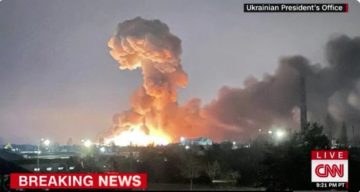
Photos from the EarthPhotos.com Ukraine Gallery except the last one, a screen shot from CNN.
